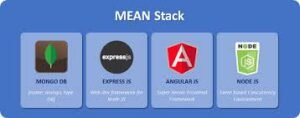Web Development using MEAN + React

Web development using MEAN (MongoDB, Express.js, Angular, Node.js) and React has become pivotal in the digital landscape for several reasons. Firstly, these technologies allow developers to build highly responsive and dynamic web applications, providing users with seamless and interactive experiences. MongoDB, a NoSQL database, enables efficient data storage and retrieval, crucial for scalable applications.
Express.js and Node.js form a robust backend, ensuring swift server-side operations and real-time updates. Angular and React, on the other hand, offer powerful frontend frameworks, enhancing user interfaces and enabling the creation of single-page applications (SPAs) that load faster and respond quickly to user interactions.
Moreover, MEAN and React empower developers to create cross-platform applications, optimizing resources and reducing development time. Their open-source nature fosters a vibrant community, ensuring constant updates and improvements, making them highly adaptive to evolving industry standards.
In today’s competitive digital market, businesses demand dynamic, responsive, and user-friendly websites and applications. MEAN and React provide the essential tools and frameworks to fulfill these requirements, making them indispensable for modern web development projects.
What You'll Learn
- Development Framework Basics
- Requirement Specifications, High-level and Low-level specifications
- Understand the flowchart, complexity of requirements
- Introduction of Type Script, setting up the environment
- Data Types and Variables, De-structuring & Spread
- Working with Classes, Constructor methods, Inheritance of class
- Modules, Export Import Syntax, Understanding web technologies & Bootstrap
- HTML structure, content, heading, multimedia content, navigations
- List Item
- Building form for user interactions with form elements
- CSS for organizing table, data, layout, box model
- The role of CSS in web and mobile design and inline, internal, and external CSS.
- Responsive web design - Media queries and creating responsive layouts
- Mobile-first design principles
- Introduction to JavaScript, Variables, Data Types, and Operators
- Control Structures and Functions, DOM Manipulation
- Asynchronous Programming, Local Storage and Web Storage
- Error Handling and Debugging
- List Item
- Mobile Development Considerations
- Intro to Angular JS, Controllers and Scope
- Directives & Services, Dependency Injection, Routing, Forms and Validation
- Intro to MongoDB, Understanding NoSQL and it’s formation, usage
- Data Modeling and Schema Design, CRUD Operations, Aggregation Framework
- Indexing and Query Optimization, Replication and Sharding
- Security and Authentication
- Node.js Basics and Core Concepts, Asynchronous Programming and Callbacks
- Node Package Manager (NPM), Express.js Framework
- Database Connectivity and CRUD Operations
- Intro to Express JS, Middleware Implementation using express JS
- Routing and Route Handling, Template Engines and Views
- Intro to ReactJS, Components and Props, State and Lifecycle
- Handling Events, hooks function without writing class
- React Router and Navigation, State Management (Context API, Redux)
- Assignments
Avg. Salary Of Test Engineer (1 Years) In Bangalore/india
- Startup Business: INR 2.5 L - 4.8 L/ Annum
- Industry Range: INR 3.3 L - 4.8 L/ Annum
- Based on Famous company review site: INR 3 L / Annum
- Based on secondary data analysis
This Course Includes:
- TImeline : 430 Hours
- Mode & Cost : Online , Contact Us
- Theory: 30%
- Hands-On Assignments/Projects: 60%
- Discussion: 10%
Tools / Technologies Involve

FAQ
MEAN is a powerful technology stack for web development, encompassing MongoDB, Express.js, Angular, and Node.js. MongoDB: A robust NoSQL database storing data in JSON-like format, providing flexibility and scalability. Express.js: A minimal and efficient backend framework for Node.js, simplifying server-side application development. Angular: A popular front-end framework maintained by Google, enabling dynamic, single-page web applications. Node.js: A server-side runtime environment for executing JavaScript, facilitating server-side logic, and handling requests. Together, these technologies form MEAN, enabling developers to create seamless, feature-rich, and highly responsive web applications, all using JavaScript across the entire stack. MEAN is renowned for its speed, flexibility, and ease of use in modern web development.
React.js is essential for front-end java script lib used in modern web development due to its efficiency and flexibility. Its component-based architecture promotes reusability and easier maintenance of code, saving time and effort. React’s virtual DOM ensures fast rendering, enhancing user experience. Moreover, it has a vast and active community, providing extensive resources and support for developers.
A responsive website is a design approach that ensures a seamless and optimized user experience across various devices and screen sizes, including desktops, tablets, and smartphones. It dynamically adjusts the layout, images, and content based on the user’s device, providing easy navigation and readability. Responsive websites enhance accessibility and user satisfaction, regardless of the device being used to access the site.
MongoDB is commonly used in MEAN stack development because it aligns well with the JavaScript-based technologies within the stack. MongoDB, a NoSQL database, stores data in JSON-like documents, which is a format easily manipulated with JavaScript. This synergy makes it seamless to work with Node.js on the server side and Angular.js/Express.js on the client side, ensuring consistent data structures and simplifying the development process. While other databases could be used, MongoDB’s compatibility and flexibility make it a popular choice in MEAN stack applications.
Mean with react.js does that help in web development?
MEAN is not a product of a specific company; it’s an acronym representing a set of technologies used together for web development. MEAN stands for MongoDB, Express.js, Angular.js, and Node.js. MongoDB is a NoSQL database, Express.js is a web application framework for Node.js, Angular.js is a JavaScript framework for building dynamic web applications, and Node.js is a JavaScript runtime environment. These technologies are open-source and maintained by their respective communities, rather than being associated with a single company.
The primary difference between MEAN and MERN stacks lies in the front-end JavaScript framework used. MEAN stack uses Angular.js as its front-end framework, while the MERN stack uses React.js. MongoDB, Express.js, and Node.js are common components in both stacks, providing a consistent back-end structure. The choice between MEAN and MERN often depends on developers’ preference for Angular.js (MEAN) or React.js (MERN) for building dynamic user interfaces. Both stacks are popular for building modern, full-stack web applications.
Both MEAN and MERN stacks are popular choices, with MEAN being known for its robustness and MERN for its flexibility.
Robustness in MEAN refers to the solidity and reliability of its components, MongoDB, Express.js, Angular, and Node.js, making it a strong choice for large-scale and complex applications. Flexibility in MERN signifies its adaptability and ease of integration with other technologies, offering developers a wide range of options and the freedom to choose components that best suit specific project needs, enhancing its versatility for various applications.
MEAN (MongoDB, Express.js, Angular, Node.js) web applications can be adjusted for mobile-based access. Angular, which is part of the MEAN stack, is particularly well-suited for creating responsive web designs, ensuring that web applications can seamlessly adapt and function across various devices, including mobile phones and tablets. MEAN stack’s frontend technology, Angular, plays a significant role in enabling mobile-friendly user experiences.